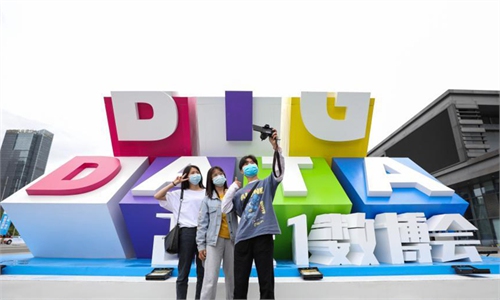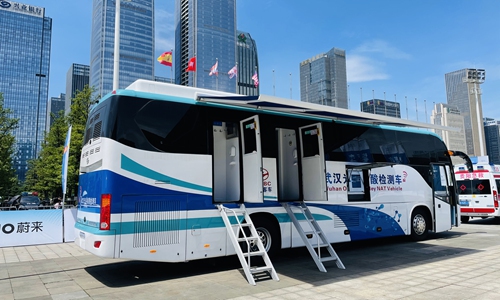Chinese researchers develop AI-steered platform facilitating COVID-19 prevention and control

Visitors view the exhibition featuring digital art during China International Big Data Industry Expo 2019 in Guiyang, capital of southwest China's Guizhou Province, May 27, 2019. The exhibition is a part of four-day China International Big Data Industry Expo 2019 that kicked off on May 26, 2019. (Xinhua/Yang Wenbin)
Chinese researchers developed a big data and artificial intelligence (AI)-steered model in a bid to reduce economical cost while carrying out accurate COVID-19 prevention and control work.The model, developed by a task force from the Department of Computer Science and Engineering at Southern University of Science and Technology, is able to complete deduction based on the model's simulation. Such model facilitated the establishment of a platform which has provided reference for the government to combat the virus.
The platform started its demonstration experiment in Shenzhen at the beginning of the year and finished the data analysis in May, Song Xuan, leader of the team and also a researcher at the department, told the China Science and Technology Daily.
As South China's Guangdong Province encountered a COVID-19 flare-up in recent month, Song said a second round of testing will be carried out in the province's COVID-19 medium and high risk areas soon.
The platform has applied for more than 40 Chinese and international patents, the researcher noted.
Working together with Shenzhen disease control and prevention center and Smartcity Tech, the team worked out the platform by integrating, processing and analyzing a variety of people's mobility and travel data. With AI technology, the platform can provide predictions and simulations of virus transmission based on the model.
In order to protect users' privacy, the task force did not require any personal information.
"How to use big data while protecting people's privacy remains one of the difficulties of our research," Song told the newspaper. "We finished the trial out of the model by not tracing people's movement but only using aggregated data. As a result, it raised high demands for our choice of model and algorithm design."
It is not Song's first case in facilitating urban management. When Japan suffered from a killer earthquake and Fukushima nuclear power station leaked, his team developed models to predict people's movement under emergency conditions as well as a platform helping the Japanese government to analyze people's migration.
In 2014, their work also helped International Telecommunication Union to analyze people's movement in West Africa, the transmission and infections of Ebola virus.
Global Times


